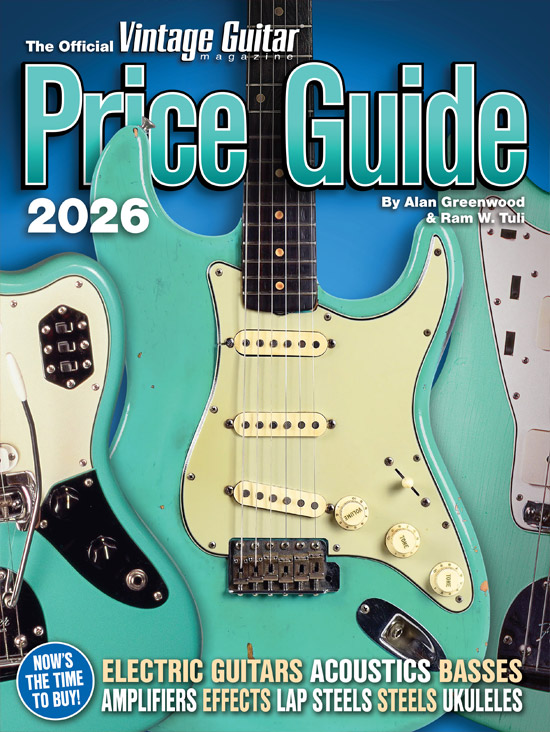
More than a half-century ago, Ten Years After sat at the vanguard of British FM rock, blending blues boogies with the solos of guitar star Alvin Lee. An essential part of the band’s attack came from bassist/producer Leo Lyons, whose steamroller lines fueled the Woodstock show-stopper “I’m Going Home.”
Today, the 80-year-old Lyons is still on the road, leading the group Hundred Seventy Split with guitar ace Joe Gooch, and promoting a new album, Movin’ On.
Throughout Movin’ On, you really let Joe off the leash as a singer and guitarist.
You’ve hit the nail on the head. He’s a great player and vocalist and, in my opinion, not even reached his full potential. As a producer, I want guitar solos to be memorable, and Joe understands that concept. He’s creative with solos and has a great feel for a melody. I take no credit for that; if the ship’s sailing on the right course, I don’t grab the wheel.
He takes a hot solo on “Black River.” How do you use your bass to make the soloist shine.
I wanted to express the mood I felt about the song, so the bass parts during his solo passages are an improvisation over the vocal melody. I sang “Black River” in my head whilst keeping my bass lines in sync with the drums. Drummer Damon Sawyer and I have built a solid musical partnership over the past 11 years.
What gear did you use on Movin’ On?
On most songs, I used my Bass Centre Woodstock signature bass, though I used a semi-hollow Warwick Star on a few. My strings are roundwound Bass Centre Elites, and aside from a couple of tracks, I used a Kemper amplifier modeling my three favorite rigs – a Gallien-Krueger 1000RB, a Genz Benz GBE 1200, and a Warwick LWA 1000.
When you played with Alvin Lee in The Jaybirds, before Ten Years After, was he already a fiery guitarist?
Alvin and I began playing together in late 1959 or 1960, in a band called the Atomites; he joined about a week after I did. He was a brilliant player and a musical magpie; he could listen to a record and learn the guitar parts very quickly.
We both particularly liked Chuck Berry and the early Elvis records cut at Sun Studios. Alvin pretended to be Scotty Moore and I pretended to be Bill Black, who was a big influence on me. I tried to emulate Bill’s sound and style by plucking the strings and hitting the fingerboard in a certain manner.
What was Alvin like as a guitarist?
I’d say he was an exciting player and a great showman, as well as probably the fastest and most-impressive rock guitarist of his day. By his own admission, he was self-taught and played intuitively; Alvin once said, “I play from the hip like a gunslinger.” We’d begin playing a song and it would take us off on a musical journey that often ended up as a duel between bass and guitar.
What’s the essential history of the ’62 Jazz you played at Woodstock?
We’d played a gig in Norfolk, and to my surprise the guy in the local support band had a Jazz Bass. We agreed to a swap – my Precision and £15 for his Jazz. The guy was Ian Hunter, who went on to form Mott The Hoople, and he still has that 1960 P Bass.
The Jazz has been with me since then, and most people remember it from the Woodstock movie. Even Jimi Hendrix played it, and it’s been used on the records I produced, including UFO. These days, it’s too valuable to tour with, so I keep it locked up, brought out for special occasions.
There’s also a 1955 Precision you found with Billy Gibbons.
This was before ZZ Top was well-known, sometime around 1969/’70, in the middle of a U.S. tour. I visited a pawn shop in Houston with Billy and Dusty Hill, and there was this ’55 Precision in the window. The neck seemed post-1955, but a Fender expert told me that at Fullerton they were mixing and matching parts. There’s a film somewhere of me playing it at the 1970 Isle of Wight Festival. I gave it to my son, Tom, several years ago, as he liked it so much.
What keeps you going after 60 years as a professional bassist?
I’ve thought about retiring many times, but I’m a musician, and I just can’t help picking up my bass one last time. Music is a powerful drug, and I love what I do.
This article originally appeared in VG’s January 2024 issue. All copyrights are by the author and Vintage Guitar magazine. Unauthorized replication or use is strictly prohibited.



